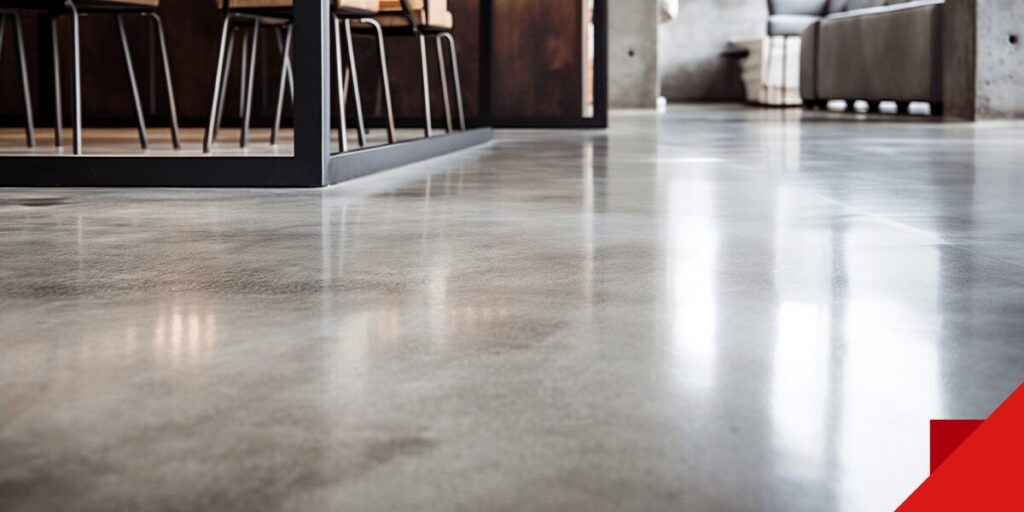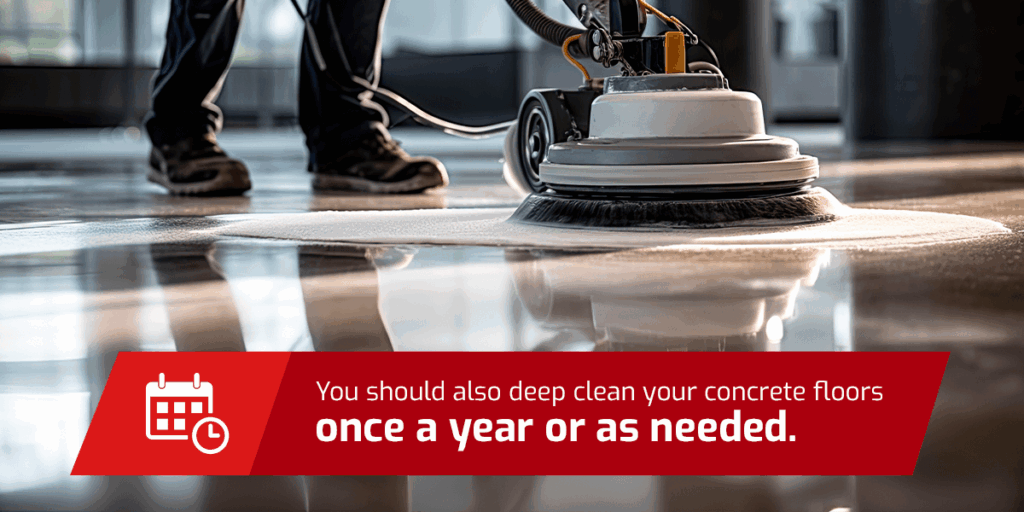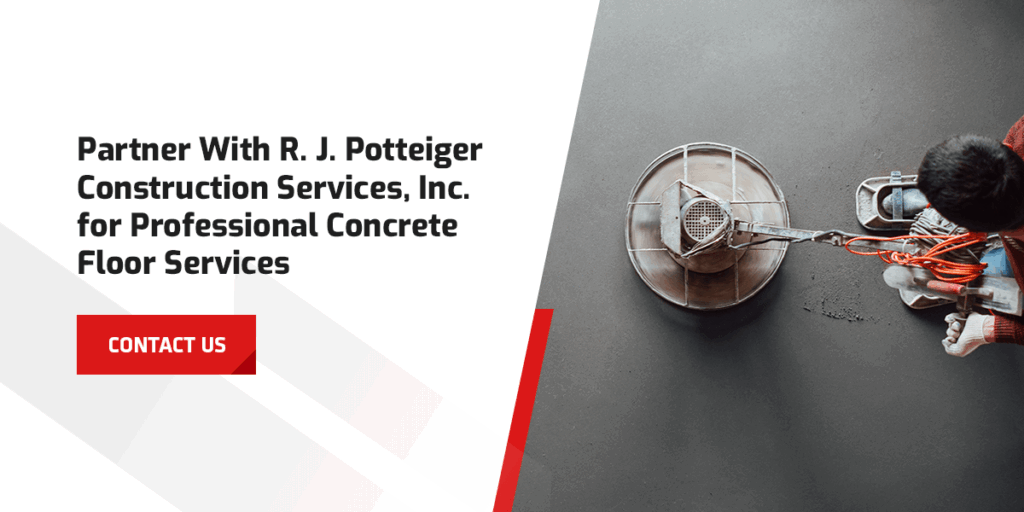How to Clean Concrete Floors

Concrete is a sturdy, cost-effective and durable material, making it a popular flooring choice for homes and commercial spaces. While easy to clean, even low-maintenance floors like concrete require routine maintenance to keep them in good condition. The porous flooring material can soak up dirt and spills and harbor mildew, causing accidents and falls. Routine cleaning can ensure the safety, longevity and overall quality of your concrete floors.
Continue reading for instructions on cleaning different types of concrete flooring and how to preserve the aesthetics and quality of residential and commercial concrete flooring.
Importance of Cleaning Concrete Floors
From sealed concrete floors to polished concrete floors, cleaning and maintaining them regularly is essential. Even indoor concrete floors are susceptible to stains, discoloration, scratches and scuffs. Here are a few reasons you should clean your residential or commercial concrete floors:
- Safety: Slips, trips and falls are common accidents in commercial spaces like warehouses and offices, but you can help prevent them by cleaning your concrete floor and clearing debris regularly. These floors are porous and prone to moisture issues, especially concrete basement floors where leaks or flooding can be common. A damp environment allows mold spores to grow, which can cause allergy symptoms in people who spend a lot of time in these spaces.
- Efficiency: Keeping your commercial concrete floor tidy can help you maintain productivity. When your employees spend a lot of time searching for tools and products or must navigate cluttered walkways, it slows operation. A clean and organized floor allows everyone to complete jobs more quickly and effectively.
- Longevity: Mold and bacteria growth can compromise the strength and durability of concrete surfaces, thus reducing their life span. Keeping your floor clean and free of stains and moisture can help you preserve the integrity of your flooring.
- Aesthetics: Whether you have decorative concrete floors in your home or on your patio, routinely cleaning them can preserve their aesthetics. If your commercial flooring has concrete flooring, cleaning it regularly will reflect highly on your company.
A safe, efficient and presentable space is essential for homes and when maintaining a business.
Cleaning Process for Concrete Floors
The following are basic cleaning steps, deep cleaning methods and stain removal techniques to help you maintain the quality of your concrete floors.
Basic Cleaning Steps
It’s important to dust and mop indoor concrete floors at least weekly and remove debris from pathways regularly. Be sure to inspect for stains, cracks or damage to act fast and prevent costlier repairs in the long run. Cleaning steps include:
- Gather supplies: Grab your cleaning solutions, such as mild detergent, vinegar or baking soda. Ensure you have the right tools, including a broom, vacuum and scrub brush. Protective gear like gloves and knee pads is also essential. Avoid harsh cleaners like bleach or ammonia on polished or sealed concrete floors, which can etch, discolor or dull the concrete. Use a gentle microfiber wet mop and warm water for polished concrete floors.
- Sweep or vacuum: Use a vacuum or broom to remove loose dirt and debris. Sweeping before cleaning can help prevent scratching the surface when mopping.
- Mop with water and detergent: Mop the floor with a mild detergent, such as liquid dish detergent or a stone cleaner. Mix a solution, evenly apply to the floor with a wet mop and allow it to sit for 30 minutes. Dip your mop in clean water and spread it on the surface to rinse.

Deep Cleaning Techniques
You should also deep clean your concrete floors once a year or as needed. The process might include:
- Power washing: Power washing is the easiest way to clean outdoor concrete. You should be able to eliminate dirt, mildew and grime fairly quickly. Rent a power washer and read the instructions on how to use the machinery before starting. Spray the surface with a detergent and scrub it into the concrete using a stiff brush. Wear safety goggles and gloves while using a power washer.
- Acid washing: Acid washing is ideal for cleaning heavily stained surfaces, such as rust or dried grout. Use this toxic material cautiously — wear protective eyewear and gloves, and follow the manufacturer’s instructions.
Dealing With Specific Stains
Like any surface, the quicker you treat stains on concrete, the easier they will be to remove. Follow these instructions to clean specific stains:
- Oil and grease stains: Treat grease stains immediately with a thick layer of kitty litter or cornstarch. Let it sit on the stain for a day or up to three days. Sweep up the litter and repeat the process if the stain remains. Next, spray the area with a degreaser and scrub before rinsing.
- Rust stains: Clean your concrete surface with soap and water, and then soak the stain in pure lemon juice. Let it sit for 10 to 15 minutes before using a wire brush to scrub at the spot. Rinse it and let it dry, repeating the process if necessary. White vinegar can be a stronger solution if the stain is especially deep.
- Mold and mildew: If mildew growth on your concrete isn’t heavy, try a vinegar and baking soda solution. If it is heavy, use chlorine bleach to kill the spores effectively and remove stains. Mix one part chlorine bleach with two parts water, apply to the stain, scrub with a nylon-bristled brush, and then rinse thoroughly.
- Paint stains: To remove paint stains without damaging the floor, use a scraper or thin piece of plastic to lift off as much paint as you can without spreading it. Use a paper towel to blot up more. Apply acetone to the stain, ensuring the area is well-ventilated and let it sit.
Additionally, professionals can help you effectively apply a sealant, preventing stains and protecting your concrete floor in the long run.
Signs You Need To Replace Your Concrete Floor
If you notice any cracks, potholes, pooling water or uneven areas in your concrete floor, it’s likely time to replace it. Here are a few signs it’s time to call for professional concrete floor services:
- Severe cracking: Cracks in your concrete floors can be unattractive and lead to trips or falls. If you notice severe cracking and buckling, it’s probably time for a garage floor replacement.
- Uneven surface: If you notice an uneven garage floor, it might mean your concrete was improperly installed. Consult with a professional to determine whether there might be something wrong with the foundation beneath your flooring or if the concrete isn’t thick enough. Professionals can reinforce the concrete and replace your flooring to ensure it holds up better.
- Sinking: Over time, water underneath a concrete floor can penetrate the soil and cause the surface to sink. Insufficient drainage, which should redirect water away from the floor, might be the culprit. Professionals can address improper drainage and replace your floor.
- Old and worn areas: Concrete floors can wear over time, whether from excess weight, exposure to chemicals and other liquids or shifts in temperature and moisture.
Partner With R. J. Potteiger Construction Services, Inc. for Professional Concrete Floor Services
It’s essential to regularly clean your concrete floors for long-lasting results or replace them if needed. The highly skilled staff at R.J. Potteiger Construction Services, Inc. has over 25 years of experience doing the job right on the first attempt. Our services include commercial and residential concrete contractor work, including pouring structure concrete, creating warehouse floors, removing concrete and more.
We can service floors with wear or replace them entirely if needed, and we have extensive experience servicing several types of concrete flooring, including warehouse floors, parking lots, loading dock pits, walkways, garage floors and patios. To get started, view our large service area and contact us for a quote.




